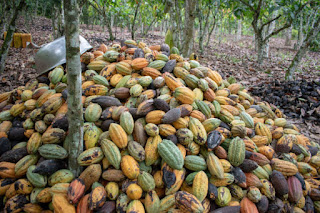Profitable Crops to Grow in Africa
Profitable Crops to Grow in Africa: Top Picks for Agripreneurs
Africa is blessed with vast arable land, diverse climates, and a growing population. These factors make agriculture one of the most promising sectors for economic growth on the continent. If you’re looking to start a farm or invest in agriculture, knowing which crops are the most profitable is the first step to success. Whether you're a small-scale farmer or an agribusiness investor, choosing the right crops can significantly boost your income.
In this article, we explore some of the most profitable crops to grow in Africa, based on market demand, export potential, climate adaptability, and return on investment.1. Maize (Corn)
Why it's profitable:
Maize is a staple food in many African countries, including Nigeria, Kenya, Zambia, and South Africa. It is in high demand for both human consumption and animal feed. Farmers can harvested it within 3–4 months, and with proper fertilization and hybrid seeds, yields can be impressive.
Value addition: You can earn more by processing maize into flour, grits, or animal feed.
Tip: Use improved, drought-resistant varieties and apply proper spacing, weeding, and fertilizer to maximize profit.
2. Cassava
Why it's profitable:
Cassava is drought-tolerant and grows well in poor soils, making it a resilient crop for many parts of Africa. It is used for food (fufu, garri, cassava flour), industrial starch, and even biofuel production.
Fast fact: Nigeria is the largest producer of cassava globally, and the demand continues to rise across Africa.
Tip: Modern cassava varieties mature in 6–9 months and give high yields. Mechanized peeling and processing also increase profitability
3. Tomatoes
Why it's profitable:
Tomatoes are in constant demand across urban and rural areas. Fresh tomatoes, tomato paste, and sauces are consumed daily in almost every African household. The crop has a short growing cycle (2–3 months), which means quick returns.
Challenges: Tomatoes are sensitive to pests and diseases. However, with greenhouse or drip irrigation systems, you can control pests and grow them all year round.
Tip: Target the off-season (dry season) when prices are higher.4. Rice
Why it's profitable:
Rice consumption is rapidly increasing in Africa, with countries like Nigeria importing billions of dollars’ worth annually. Local rice production, processing, and packaging offer massive profit potential.
Requirements: It needs plenty of water, so areas with good irrigation or rain-fed systems are ideal.
Tip: Invest in improved rice varieties with high yield and short maturity cycles (3–4 months).5. Soybeans
Why it's profitable:
Soybeans are in demand for cooking oil, livestock feed, and protein-rich food. They are also a key raw material in many agro-industrial processes. Moreover, soybeans help to fix nitrogen in the soil, improving soil fertility.
Markets: High demand in Nigeria, Ghana, Uganda, and global export markets
Tip: Combine soybean farming With livestock to create a sustainable integrated farm.
6. Groundnuts (Peanuts)
Why it's profitable:
Groundnuts are used to produce peanut butter, groundnut oil, and snacks. The crop is in high demand across West Africa and beyond. It grows well in warm climates and can be harvested within 3–4 months.
Extra income: You can also earn from selling the shells as animal feed or biomass.
Tip: Use certified seeds and rotate with maize or legumes to maintain soil health.
7. Horticultural Crops (Fruits and Vegetables)
Examples: Watermelon, cabbage, onions, carrots, okra, peppers, cucumbers, etc.
Why they’re profitable:
These crops fetch high prices in both local and export markets. Some, like watermelon and onions, have long shelf life and strong demand in urban centers. Exportable crops like avocados, mangoes, and pineapples bring in foreign exchange.
Tip: Use irrigation systems to grow vegetables during the dry season for better market prices.
8. Palm Oil
Why it's profitable:
Palm oil is used for cooking, cosmetics, soaps, and industrial purposes. Once the palm trees mature (about 3–4 years), they provide income for 25–30 years. With value-added processing (turning fruits into oil), your profit margins increase.
Top producers: Nigeria, Ghana, Côte d’Ivoire.
Tip: Consider hybrid varieties and small-scale processing equipment to reduce losses and increase yield.
9. Sugarcane
Why it's profitable:
Sugarcane is a great cash crop in regions with sufficient water. It is used in sugar production, juice, alcohol, and biofuel. The plant also regenerates after harvesting (ratoon cropping), giving multiple harvests from a single planting.
Market: Sell to sugar mills, juice producers, or local markets.
Tip: Proper irrigation and spacing are key to achieving good yields.
10. Export Crops: Cocoa, Coffee, and Tea
Why they're profitable:
These crops are in high demand globally and generate foreign exchange. Ghana and Côted’Ivoire lead in cocoa, Ethiopia is famous for its coffee, and Kenya is a top tea exporter.
Challenges: These are long-term investments, as it may take 3–5 years before harvest. However, the returns are huge and stable.
Tip: Partner with cooperatives or government schemes for support and access to export markets.Bonus: Herbs and Spices
Examples: Ginger, turmeric, garlic, basil, lemongrass.
Why they're profitable:
These crops are easy to grow and in high demand locally and internationally. Ginger and turmeric, in particular, are gaining popularity due to their health benefits.
Export potential: Dried or powdered forms can be exported to Europe, the U.S., and Asia.
Final Thoughts
Africa’s agricultural potential is enormous, but success depends on choosing the right crop, understanding the market, and adopting smart farming practices. With the rise in population, urbanization, and food demand, agriculture remains a goldmine waiting to be explored.
Whether you’re farming for local markets or international export, these profitable crops to grow in Africa offer opportunities for wealth creation, job creation, and sustainable development.









